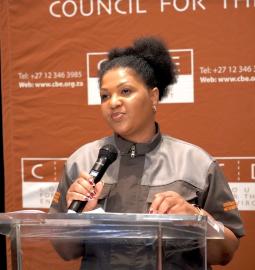
By Bernice Swarts
South Africa recently participated in the 36th Meeting of the Parties to the Montreal Protocol on Substances that Deplete the Ozone Layer (MOP 36) in Bangkok, Thailand.
The Montreal Protocol, established in 1987, is a landmark global treaty aimed at protecting the ozone layer by phasing out ozone-depleting substances (ODS). Despite the Protocol’s successes, some ODS replacements, specifically hydrofluorocarbons (HFCs), have emerged as potent greenhouse gases, some over a thousand times more powerful than carbon dioxide in driving climate change.
At MOP 36, South Africa reaffirmed its commitment to eliminating ozone-depleting substances. Central to our approach is our belief in the Montreal Protocol as a highly effective framework for reducing ODS while offering significant co-benefits for global climate health. We celebrated the recent decision to allocate $1 billion to the Multilateral Fund to help developing nations meet their Protocol obligations, showcasing the international community’s dedication to this critical cause.
As one of Africa’s most industrialised nations, South Africa recognizes its role as a leader in climate action. Our national action plan emphasizes transitioning the Refrigeration and Air Conditioning (RAC) sector towards greener refrigerants and energy-efficient systems. This shift is directly aligned with global climate goals, creating jobs and enhancing sustainability within South Africa’s industrial landscape. By managing refrigerants effectively, we can contribute to reducing global warming by 0.5°C, proving that industry-specific actions can have impactful climate outcomes.
South Africa is also committed to the full life-cycle management of refrigerants, ensuring that substances are properly controlled, recovered, recycled, or reclaimed.
During MOP 36, we showcased South Africa’s commitment to sustainable practices by training hundreds of technicians, particularly young people, in energy-efficient refrigeration and air-conditioning technologies. Our government – through the Department of Forestry, Fisheries and the Environment (DFFE) – and various stakeholders aim to train1 600 more young people in energy-efficient refrigeration and air-conditioning technologies in the near future. This investment in local capacity reflects our dedication to minimising environmental impact over the long term.
South Africa also used its participation at the MOP 36 to raise an issue of continental significance: the lack of sufficient monitoring facilities across Africa. Our country operates three monitoring stations through its Weather Services, but there is an urgent need for additional resources to expand this capability. We called for financial assistance to establish more state-of-the-art monitoring stations across Africa, enhancing the global repository of scientific data for tracking and managing emissions. This call for support underscores Africa’s crucial role in contributing to a global climate response.
South Africa has also made significant progress in phasing out methyl bromide, a highly ozone-depleting substance, showcasing our commitment to long-term environmental sustainability.
Another critical issue addressed at MOP 36 was the healthcare sector’s reliance on ozone-depleting substances, particularly in metered-dose inhalers. We urged a shift to greener alternatives, emphasizing the dual importance of public health and environmental protection.
South Africa’s experience also demonstrates the value of strict regulatory enforcement to prevent illegal trade in controlled substances and low-efficiency products. By investing in customs training to detect illegal trade, South Africa is addressing an often-overlooked aspect of environmental governance: the importance of preventing leakage through illicit imports and exports that could undermine international agreements. Our proposal included a two-pronged approach—strict regulations and penalties for non-compliance—aimed at helping all nations meet their environmental goals.
During my remarks at MOP 36, I called for the ratification of the Kigali Amendment to the Montreal Protocol, urging all nations to take action against climate-warming HFCs. This appeal highlights the interconnected nature of environmental challenges and the importance of collective global action. The Montreal Protocol stands as a model for effective international cooperation, and South Africa’s call for universal ratification underscores our commitment to preserving and extending its benefits.
I do want to stress that South Africa’s presence at MOP 36 was a powerful reminder of the urgency of climate action. Through robust national initiatives and a vision for global cooperation, we called on the world to strengthen efforts in environmental protection, ozone layer preservation, and climate change mitigation for future generations. Our actions and commitments reflect a roadmap for immediate impact and a testament to the resilience needed to secure a sustainable future for all and for future generations.
*Bernice Swarts is the Deputy Minister of Forestry, Fisheries and the Environment*


